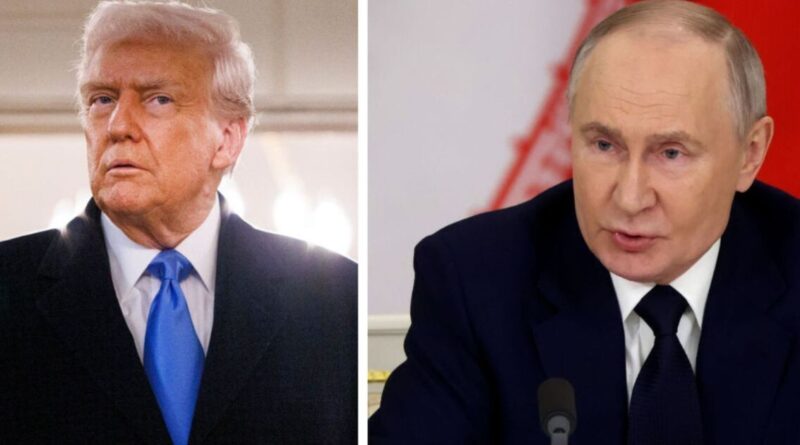How UK can dodge Donald Trump’s wrath and humiliate Putin in one go | World | News
As the war in Ukraine continues to reshape Europe’s trade calculations and growing fears of renewed US protectionism loom, a solution presents itself in the form of a historic trade route – the Middle Corridor.
This route, which follows the ancient Silk Road, offers Britain the opportunity to sidestep potential tariffs from a protectionist US while striking a blow to Vladimir Putin‘s economic stranglehold.
By focusing on trade through Central Asia, Britain could avoid punitive tariffs under Donald Trump and capitalise on Russia’s diminishing relevance in global trade.
At the same time, this would support Britain’s climate goals, making it a win-win for both economic and environmental strategies.
Now, the question is whether Keir Starmer’s Government will have the foresight and political courage to seize this opportunity.
Decarbonising trade routes remains a high priority for the UK, and an overland corridor through Central Asia offers a substantial reduction in carbon emissions.
Maritime shipments, especially those passing through the Suez Canal or the Arctic’s Northern Sea Route, have historically been cheaper in bulk but inflict a considerable carbon footprint due to heavy fuel usage and the distances involved.
By contrast, the Middle Corridor, reliant on an approximate 70/30 rail-to-sea split, cuts emissions by half compared to the Suez of the Northern Corridor through Russian, to 154 tons of CO₂ per ton of cargo.
Trains can run on increasingly green grids and move freight in a more energy-efficient manner than vast cargo vessels. For Britain, aligning trade with a lower-carbon path is not just good for the environment; it also reinforces its global reputation for upholding sustainable, climate-friendly policies in a world wary of rising emissions.
Although climate is high on the agenda, an immediate priority goal for the government remain the continued war in Ukraine and standoff with Russia.
Positioned at the heart of Eurasia, Kazakhstan offers a secure alternative to the Russian-dominated routes many shippers once took for granted, as the Central Asian state has moved towards modernising its infrastructure, exemplified by the development of the Khorgos Gateway and the Astana International Financial Centre (AIFC).
These initiatives provide smoother customs procedures and an investment climate familiar to Western businesses, thanks to English common law at the AIFC.
Compared with maritime paths around conflict-prone regions, or rail lines dependent on Russia, the Kazakh route demonstrates shorter transit times, lower administrative friction, and increased reliability.
Central Asia, largely overlooked by Western nations, remains mindful of nearby powers that traditionally influence its politics and markets.
By increasing engagement with countries like Kazakhstan, the UK can forge stronger relations independent of Moscow’s or
Beijing’s dictates, already embolden by the visits by the former Foreign Secretary David Cameron and other dignitaries in recent years.
Central Asian states, in turn, welcome partners that offer genuine alternatives to the historical dominance of Russia’s economic and security framework or the more recent, far-reaching Belt and Road Initiative of China.
In a region where democratic norms and freedoms are often lacking, Britain’s involvement brings the possibility of investment accompanied by values-based cooperation.
Although building robust institutions is a gradual process, the very presence of trade agreements backed by British businesses will encourage local governments to adopt transparent, rules-based practices.
More than that, the UK can claim a new foothold in an area once deemed peripheral, exactly when there is a global appetite for routes that sit beyond Russia’s choke points.
The Middle Corridor does more than just expedite Britain’s supply chains. It opens doors for UK companies, from engineering consultancies to financial services, to support the corridor’s infrastructural expansions.
Rail modernisation, port upgrades, and green energy transition projects require outside expertise, and many Central Asian states are prepared to incentivise foreign investment.
By shifting freight traffic through Kazakhstan, British firms stand to gain from stable transit times that reduce warehousing needs and cut uncertainty costs.
Moreover, they can tap into the emerging consumer markets in Central Asia, where populations increasingly demand imported goods and modern services.
This diversification away from sole reliance on shipping lanes or on precarious Russian routes also positions the UK as a nimbler global trader, unafraid to pivot when conditions demand.
Donald Trump’s return to political office and his pursuit of protective tariffs have raised concerns that American isolationism will escalate. Should the UK’s relationship with a Republican White House sour, British exporters might find themselves on the receiving end of damaging tariffs, especially given the sometimes-rocky rapport between Washington and a Labour-led government in Westminster.
A trade spat with the United States, akin to the current tensions with Canada, is no longer an abstract possibility.
In that environment, securing alternative markets becomes vital, and Central Asia, with a rail corridor passing safely through Kazakhstan, Azerbaijan, and on into Turkey before reaching the EU, can function as a critical lifeline.
All eyes are on the UK’s capacity to weather economic storms and champion a rules-based system that so many others have recently eroded.
With the United States showing signs of introversion, the UK can reaffirm its stance as an advocate of free trade and liberal democracy by doubling down on ties with places like Kazakhstan.
The Middle Corridor’s development offers a practical demonstration of that commitment: a new path for goods, a fresh alliance for growth, and a reminder that, even in a geopolitical climate prone to contraction, Britain aims to advance rather than retreat.




